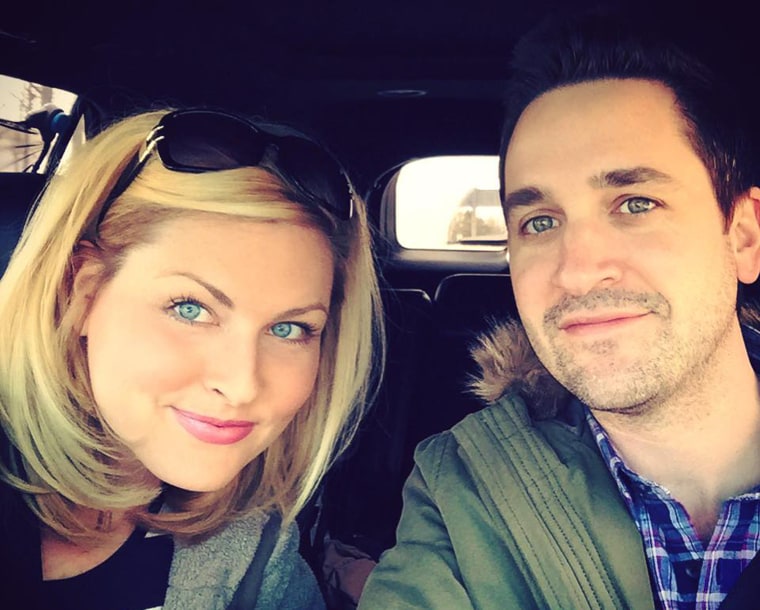Jessica Starr had never been much of a crier, so it alarmed her husband when she returned from her first day back at work following laser eye surgery and burst into tears.
Starr was a meteorologist at Fox 2 News in Detroit who underwent a procedure known as SMILE on Oct. 11 to correct her vision. Only two months later, she died by suicide at 35, leaving behind her husband, Dan Rose, 40, and their two young children.

Rose believes those two events are strongly connected. He is hoping that by speaking out, he can warn others to do their research before undergoing the procedure.
"If anyone would've told me or her family, and said she was capable of hurting herself, I wouldn't have believed you,'' Rose told TODAY. "Without a doubt in my mind, something related to this procedure triggered this."
"For whatever reason, she thought this was the only way out. I'm having a hard time wrapping my head around that."
Starr had worn glasses or contact lenses for 23 years when she decided to get laser eye surgery. She initially wanted to get LASIK surgery, but Rose said she was convinced by her doctor to instead get the small incision lenticule extraction (SMILE) procedure.
SMILE was approved by the Food and Drug Administration in 2016 and involves a laser cutting a tiny, disc-shaped piece of corneal tissue, as opposed to a large flap like in traditional Lasik surgery. The removal of the tissue then flattens the center of the cornea and reduces or eliminates nearsightedness and astigmatism, according to the FDA.
The procedure is considered less invasive than Lasik and normally involves a shorter recovery time. Starr was told she would only need about five days to heal and get back to work.
"Jessica was very in tune with her body,'' Rose said. "Within three or four days after the procedure, she started saying stuff like, 'I think something went wrong. I don't feel right.'''
A 2015-16 study by the FDA of 357 patients who had the SMILE surgery found 6.7 percent experiencing moderate or severe glare and less than 5 percent experiencing any other complications within a month of the surgery. The study also found less than 1 percent of patients had negative effects like halos or starbursts a year after the procedure.
Complications can include dry eyes; double or blurry vision; difficulty seeing at night; and light sensitivity. The side effects often disappear over time, but they can be permanent in some cases and may be so bothersome or painful that people have taken their own lives, The New York Times reported in June.

Dr. Sidney Gicheru, an ophthalmologist in Dallas and a spokesperson for the American Academy of Ophthalmology who did not work with Starr, has been performing laser vision correction since 2000 and told TODAY he rarely has seen mild complications last longer than three months.
"I've never seen an occasion of someone committing suicide after laser vision correction,'' he said. "The most common side effects are glare and starbursts, and they are usually mild."
"I feel a lot of sympathy for her family. This is not an outcome any Lasik surgeon or ophthalmologist would ever want. I don't think this was directly related to the procedure. I think it may have contributed somewhat, but there must've been other risk factors. That's where I would be looking."
Starr was applying drops every five minutes to clear her vision, only for it to get blurry or foggy again shortly, Rose said. Starr also had extreme sensitivity to light, which made it especially difficult with the lights in the Fox 2 News studio on Nov. 13 when she returned to work.
She posted a video on her Facebook page that she was "struggling" in her return to work.
"She was a very tough individual, but she came home after that first day, fell into my arms and just started crying,'' Rose said.

Starr also struggled with seeing halos and starbursts from the oncoming headlights while driving to work in the dark in the morning.
The initial five-day recovery period turned into seven weeks as she sought answers.
"I think us as physicians, screening these patients for surgery, we're looking at the physical aspects, but the doctor also has to look at the patient as a whole and look at the mental status,'' Gicheru said. "Make sure the patient has realistic expectations and understands the risks of the surgery."
She went to five different ophthalmologists seeking second opinions. Just days before her suicide on Dec. 12, she went to a corneal specialist in Detroit, who gave her the same answer as the other doctors — she needed more time to recover.
"I have a voicemail and you can just hear the defeat in her voice,'' Rose said.
Starr had never exhibited previous signs of depression or been on any medication to treat depression, Rose said. Between a notebook and her suicide note, she left behind more than 50 pages detailing her struggles with her vision.
"She wrote that because of the loss of vision, I can't be a mom, I can't be a wife, I can't work. I've lost every aspect of my life,'' he said.
Adding to Starr's guilt was that it was an elective procedure instead of one that was medically necessary.
"She wrote that she was fine wearing contacts, and this was something she didn't need to do,'' Rose said. "I think this procedure sent her into such a dark space."
Rose said he has since been contacted by two dozen people who have had SMILE surgery and still are experiencing complications years later.
"I don't want to shut the procedure down,'' he said. "I'm not trying to be that much of a crusader. But people need to do their homework, they need to be comfortable with their doctor, and I would like to see the follow-up care for this procedure change."
If you or someone you know needs help, please contact the National Suicide Prevention hotline at 1-800-273-8255, anytime.
